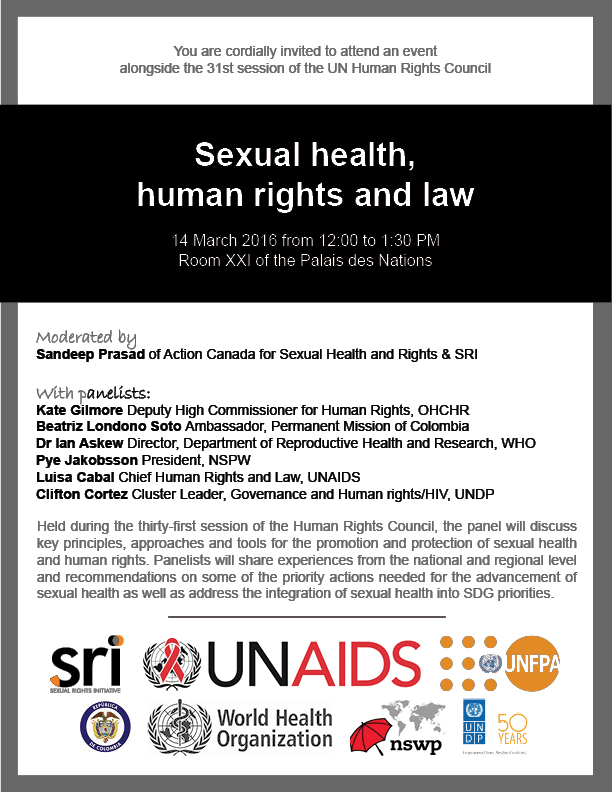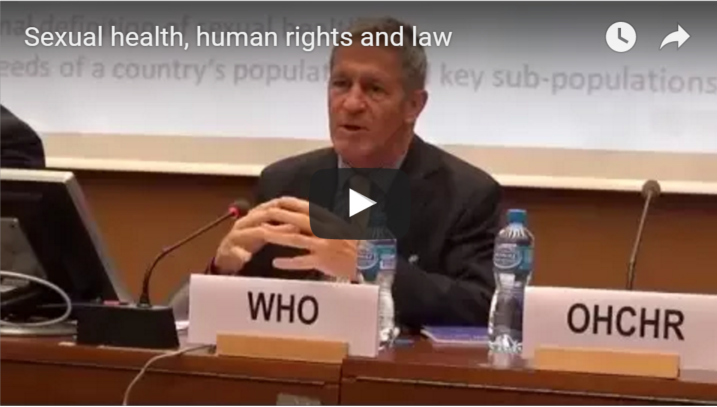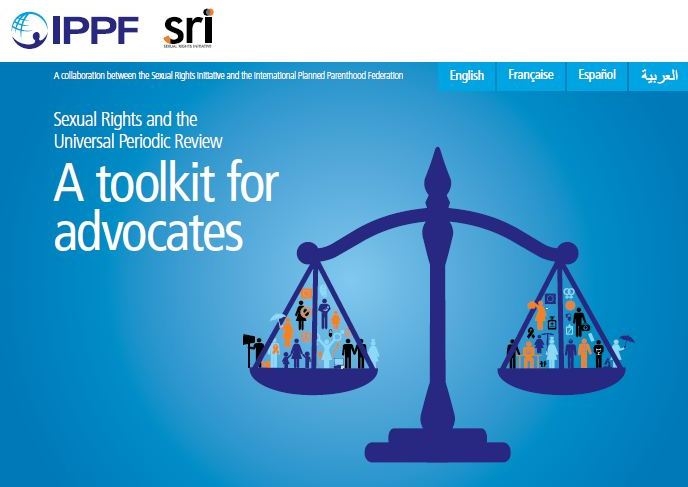Highlights: Sexual Rights at HRC31
The 31st session of the UN Human Rights Council took place from the 29th of February to the 24th of March 2016. Here is a recap of sexual rights related resolutions, panels, statements and events at the session.
The HRC31 Wrap-up provides information on some of the key sexual rights related:
- Resolutions
- Panels and Discussions
- Statements
- Parallel Events
all of which the Sexual Rights Initiative (SRI) was engaged with during the session.
Sexual Rights-related Resolutions
Protecting human rights defenders addressing economic, social and cultural rights A/HRC/31/L.28
In the resolution adopted by a vote of 33 in favour, six against, and eight abstentions, the Council called upon States to combat impunity for all attacks and threats by State and non-State actors against any individual, group or organ of society defending human rights, and encouraged business enterprises to avoid, identify, assess and address any adverse human rights impacts related to their activities through consultations with potentially affected groups.Over 150 NGOs called on Member States of the Council to adopt the resolution and reject a series of 30 hostile amendments proposed by Russia, China, Egypt, Cuba and Pakistan, designed to undermine the protection of defenders and to deny their legitimacy and very existence.
Click here to read the resolution
______________________________________
Rights of the Child: information and communications technologies and child sexual exploitation A/HRC/31/L.9/Rev.1
Adopted by consensus, the resolution is framed in the context of protecting children from online sexual abuse and exploitation and State control over online content that could be perceived as harmful to children. The resolution fails to adequately recognize children’s rights to access information and education related to sexual and reproductive health and rights that can empower them to protect themselves, recognize abusive behaviours, and have control over their own sexuality as they mature.
Next year’s annual day of discussion and resolution will focus on “Protection of the rights of the child in the implementation of the 2030 Agenda for Sustainable Development” and the OHCHR has been requested to prepare a report on the issue.
Click here to read the resolution
______________________________________
Sexual Rights-related Panels & Discussions
Panel discussion on the progress in and challenges of addressing human rights issues in the context of efforts to end the HIV/AIDS epidemic by 2030 (HRC res. 30/8)
The panel discussion provided a platform for experts and affected populations to undertake a comprehensive review of the progress achieved in addressing human rights issues in the context of efforts to end the epidemic of AIDS by 2030, including successes, best practices and lessons learned.
The SRI delivered an oral statement to the panel, noting that a lot remains to be done and calling on governments to ensure universal access to good quality, comprehensive sexuality education; to empower young people, particularly girls and young women, to realize their sexual and reproductive health and rights, and transform gender norms and power imbalance; and to eliminate the stigma surrounding HIV and AIDS, which serves to fuel the HIV epidemic and contribute to human rights violations and abuses.
Click here to read the SRI statement
Clustered ID: SASG on Prevention of Genocide and Special Rapporteur on Human Rights Defenders
The Special Rapporteur on human rights defenders presented his report, referencing LGBTI human rights defenders.
The SRI delivered an oral statement, addressing the diversity of women human rights defenders and recommending that the definition of human rights defenders be broadened to include all persons who are publicly visible due to their efforts to defend their own identities, which then makes them even more vulnerable to violence in their communities. This will ensure that all human rights defenders are able to access relief without any discrimination or difficulty.
Click here to read the SRI statement
Clustered ID: Special Rapporteur on torture and other cruel, inhuman or degrading treatment or punishment
The Special Rapporteur presented his report, which assesses the applicability of the prohibition of torture and other cruel, inhuman or degrading treatment or punishment in international law to the unique experiences of women, girls, and lesbian, gay, bisexual, transgender and intersex persons.
This report is unequivocal in its call for reform of laws that contribute to the conditions that facilitate torture, inhumane and degrading treatment of women, including criminal laws on abortion, adultery, same sex sexual activity, marital rape and more.
______________________________________
SRI Oral Statements
Outcomes from the 23rd session of the Universal Periodic Review (UPR) were reviewed during the 31st session of the HRC. The following fourteen countries were reviewed: Australia, Austria, Georgia, Lebanon, Mauritania, Micronesia, Myanmar, Nauru, Nepal, Oman, Rwanda, Saint Kitts and Nevis, Saint Lucia, and Sao Tome and Principe.
SRI delivered statements to five countries:
SRI also made statements on:
- Panel discussion on the progress in and challenges of addressing human right issues in the context of efforts to end the HIV/AIDS epidemic by 2030
- Clustered ID: Special Rapporteur on Human Rights Defenders
Click here for SRI statement transcripts and video footage
______________________________________
SRI Parallel Events



Read the SRI & IPPF UPR
Toolkit for Sexual Rights Advocates
Available in
English, French, Portuguese, Spanish & Arabic.
Created in 2006 to replace the United Nations Human Rights Commission, the Human Rights Council is the foremost international body for the promotion and protection of human rights and can be used to bring substantial pressure on governments to take steps to implement human rights norms. The Human Rights Council is comprised of governments of countries that are members of the United Nations and is an important venue to develop and advance sexual rights as a critical part of the international human rights framework.